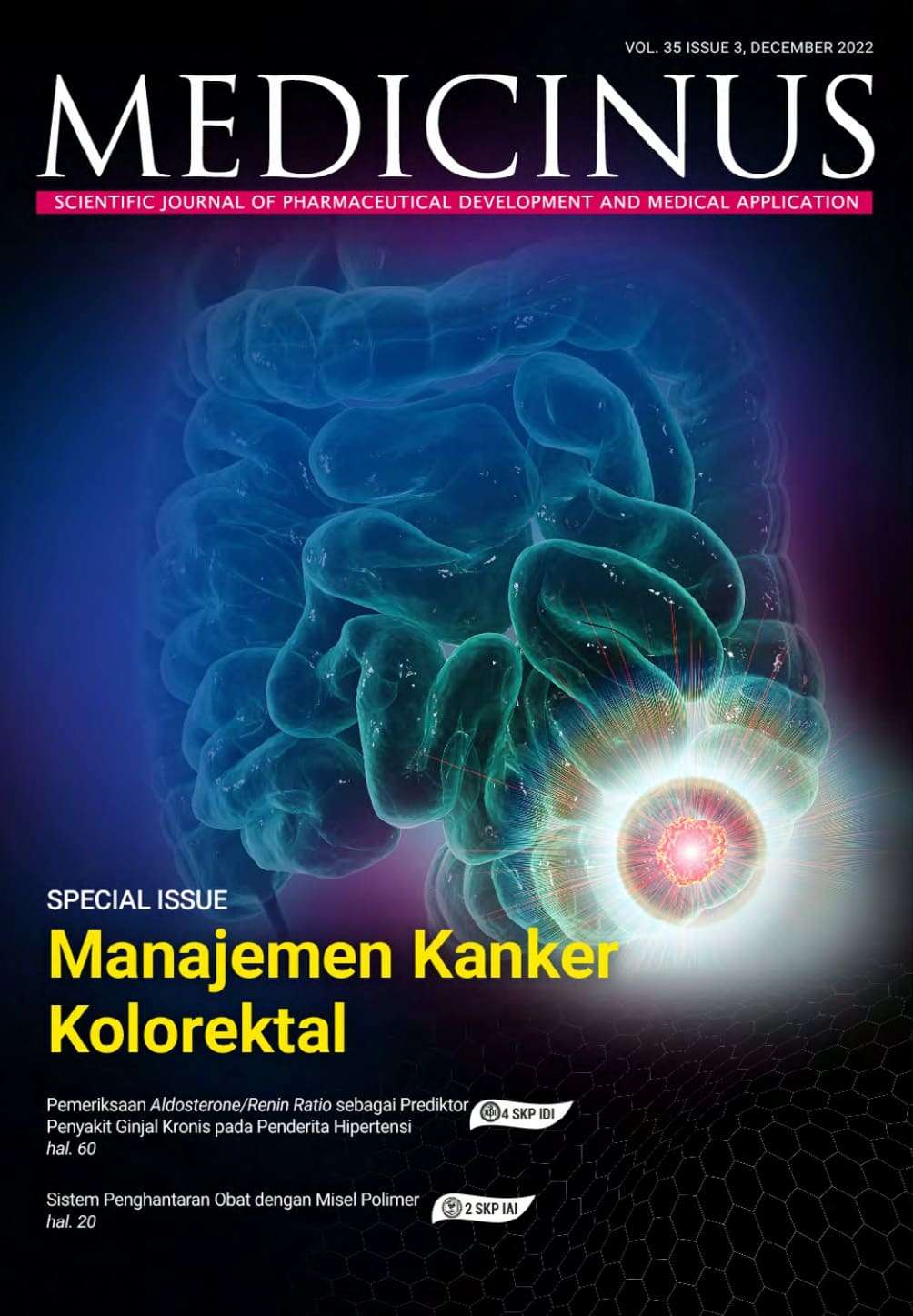Manajemen Kanker Kolorektal
DOI:
https://doi.org/10.56951/medicinus.v35i3.99Kata Kunci:
kanker kolorektal, aging, pola hidup sehat, screeningAbstrak
Kanker kolorektal merupakan salah satu jenis keganasan yang relatif jarang terdiagnosis pada beberapa dekade lampau, namun mengalami peningkatan kasus secara drastis hingga menjadi salah satu jenis penyakit kanker dengan angka kejadian tertinggi di dunia, setelah kanker payudara dan kanker paru-paru. Proses aging pada populasi, ditambah dengan berbagai pergeseran pola hidup menjadi kontributor yang signifikan pada tingginya kasus kanker kolorektal. Tata laksana kanker kolorektal terus mengalami perkembangan hingga memungkinkan perbaikan dalam hal survival serta peningkatan kualitas hidup survivor. Walaupun demikian, tingkat survival dapat lebih ditingkatkan dengan dilakukannya upaya untuk meningkatkan kesadaran publik, memberikan edukasi untuk menerapkan pola hidup sehat, serta didukung dengan kebijakan sistem jaminan kesehatan yang memungkinkan aktivitas screening, mengingat karakteristik penyakit yang umumnya asimptomatik pada tahap awal perkembangannya.
Unduhan
Referensi
Sung H, et al. Global Cancer Statistics 2020: GLOBOCAN Estimates of Incidence and Mortality Worldwide for 36 Cancers in 185 Countries International Agency for Research on Cancer. CA Cancer J Clin. 2021;71:209-49. doi: 10.3322/caac.21660. DOI: https://doi.org/10.3322/caac.21660
World Health Organization International Agency for Research on Cancer (IARC). GLOBOCAN 2020. (cited 2022 Dec 9th). Available from: https://gco.iarc.fr/today/data/factsheets/populations/900-world-fact-sheets.pdf
World Health Organization International Agency for Research on Cancer (IARC). GLOBOCAN 2020. (cited 2022 Dec 9th). Available from: https://gco.iarc.fr/today/data/factsheets/populations/360-indonesia-fact-sheets.pdf
Triantafillidis JK, et al. Colonoscopy in Colorectal Cancer Screening: Current Aspects. Indian J Surg Oncol. 2015;6(3):237–50. DOI: https://doi.org/10.1007/s13193-015-0410-3
Jasperson KW, et al. Hereditary and Familial Colon Cancer. Gastroenterology. 2010;138(6):2044–58. DOI: https://doi.org/10.1053/j.gastro.2010.01.054
Li JY, et al. Real-time detection of colon polyps during colonoscopy using deep learning: systematic validation with four independent datasets. Sci Rep 2020;10:8379. DOI: https://doi.org/10.1038/s41598-020-65387-1
Kuipers EJ, et al. Colorectal cancer. Nat Rev Dis Primers. 2015;1:15065. DOI: https://doi.org/10.1038/nrdp.2015.65
GBD 2017 Colorectal Cancer Collaborators. The global, regional, and national burden of colorectal cancer and its attributable risk factors in 195 countries and territories, 1990–2017: a systematic analysis for the Global Burden of Disease Study 2017. Lancet Gastroenterol Hepatol. 2019; published online Oct 21. doi: 10.1016/S2468-1253(19)30345-0. DOI: https://doi.org/10.1016/S2468-1253(19)30345-0
Xi Y and Xu P. Global colorectal cancer burden in 2020 and projections to 2040. Translational Oncology. 2021;14:101174. DOI: https://doi.org/10.1016/j.tranon.2021.101174
Lotfollahzadeh S, et al. Colon Cancer. StatPearls. 2022 [cited 7 December 2022]. Available from https://www.ncbi.nlm.nih.gov/books/NBK470380/
Vuik FER, et al. Increasing incidence of colorectal cancer in young adults in Europe over the last 25 years. Gut. 2019;68:1820–6. doi: 10.1136/gutjnl-2018-317592. DOI: https://doi.org/10.1136/gutjnl-2018-317592
Keum N and Giovannucci E. Global burden of colorectal cancer: emerging trends, risk factors and prevention strategies. Nat Rev Gastroenterol Hepatol. 2019;16(12):713-32. doi: 10.1038/s41575-019-0189-8. DOI: https://doi.org/10.1038/s41575-019-0189-8
Durko L and Malecka-Panas E. Lifestyle Modifications and Colorectal Cancer. Curr Colorectal Cancer Rep. 2014;10:45–54. doi: 10.1007/s11888-013-0203-4. DOI: https://doi.org/10.1007/s11888-013-0203-4
López-Abente G, et al. Colorectal cancer mortality and industrial pollution in Spain. BMC Public Health. 2012;12:589. DOI: https://doi.org/10.1186/1471-2458-12-589
Jenwitheesuk K, et al. Accumulated ambient air pollution and colon cancer incidence in Thailand. Scientific Reports. 2020;10:17765. doi: 10.1038/s41598-020-74669-7. DOI: https://doi.org/10.1038/s41598-020-74669-7
Tusnio N, et al. Air Pollution Associates with Cancer Incidences in Poland. Appl. Sci. 2020;10:7489. doi: 10.3390/app10217489. DOI: https://doi.org/10.3390/app10217489
Guo C, et al. Long-term exposure to ambient fine particles and gastrointestinal cancer mortality in Taiwan: A cohort study. Environment International. 2020;138:105640. doi: 10.1016/j.envint.2020.105640. DOI: https://doi.org/10.1016/j.envint.2020.105640
Ma J, et al. Effect of ambient air pollution on the incidence of colorectal cancer among a diabetic population: a nationwide nested case–control study in Taiwan. BMJ Open. 2020;10:e036955. doi: 10.1136/bmjopen-2020-036955. DOI: https://doi.org/10.1136/bmjopen-2020-036955
Debela DT, et al. New approaches and procedures for cancer treatment: Current perspectives. SAGE Open Medicine. 2021;9:1–10. doi: 10.1177/20503121211034366. DOI: https://doi.org/10.1177/20503121211034366
Hodgkinson N, et al. Targeted photodynamic therapy as potential treatment modality for the eradication of colon cancer and colon cancer stem cells. Tumor Biology. 2017:1–17. doi: 10.1177/1010428317734691. DOI: https://doi.org/10.1177/1010428317734691
Dekker E, et al. Colorectal cancer. Lancet 2019;394:1467–80. DOI: https://doi.org/10.1016/S0140-6736(19)32319-0
National Comprehensive Cancer Network. Colon Cancer (Version 1.2022). (cited 2022 March 29th). Available from: https://www.nccn.org/professionals/physician_gls/pdf/colon.pdf.
National Comprehensive Cancer Network. Rectal Cancer (Version 1.2022). (cited 2022 March 29th). Available from: https://www.nccn.org/professionals/physician_gls/pdf/rectal.pdf.
Longley DB, et al. 5-Fluorouracil: mechanisms of action and clinical strategies. Nat Rev Cancer. 2003;3:330–8. doi: 10.1038/nrc1074. DOI: https://doi.org/10.1038/nrc1074
Culy CR, et al. Oxaliplatin A Review of its Pharmacological Properties and Clinical Efficacy in Metastatic Colorectal Cancer and its Potential in Other Malignancies. Drugs. 2000;60(4):895-924. doi: 10.2165/00003495-200060040-00005. DOI: https://doi.org/10.2165/00003495-200060040-00005
Rawla P, et al. Epidemiology of colorectal cancer: incidence, mortality, survival, and risk factors. Gastroenterology Rev. 2019;14(2):89–103. doi:10.5114/pg.2018.81072. DOI: https://doi.org/10.5114/pg.2018.81072
Duineveld LAM, et al. Symptomatic and Asymptomatic Colon Cancer Recurrence: A Multicenter Cohort Study. Ann Fam Med. 2016;14(3):215–20. doi:10.1370/afm.1919. DOI: https://doi.org/10.1370/afm.1919
Ford ME, et al. Factors Influencing Adherence to Recommended Colorectal Cancer Surveillance: Experiences and Behaviors of Colorectal Cancer Survivors. J Cancer Educ. 2019;34(5):938–49. doi: 10.1007/s13187-018-1398-5. DOI: https://doi.org/10.1007/s13187-018-1398-5
Timmers L, et al. Adherence and Patients' Experiences with the Use of Capecitabine in Daily Practice. Front. Pharmacol. 2016;7:310. doi: 10.3389/fphar.2016.00310. DOI: https://doi.org/10.3389/fphar.2016.00310
Visacri MB, et al. Adverse reactions and adherence to capecitabine: A prospective study in patients with gastrointestinal cancer. J Oncol Pharm Pract. 2022;28(2):326-36. doi: 10.1177/1078155221989420. DOI: https://doi.org/10.1177/1078155221989420
Saif MW and Reardon J. Management of oxaliplatin-induced peripheral neuropathy. Ther Clin Risk Manag. 2005;1(4):249–58.
Unduhan
Terbitan
Bagian
Diterbitkan
Unduhan
Lisensi
Hak Cipta (c) 2022 Agi Satria Putranto

Artikel ini berlisensi Creative Commons Attribution-NonCommercial 4.0 International License.




